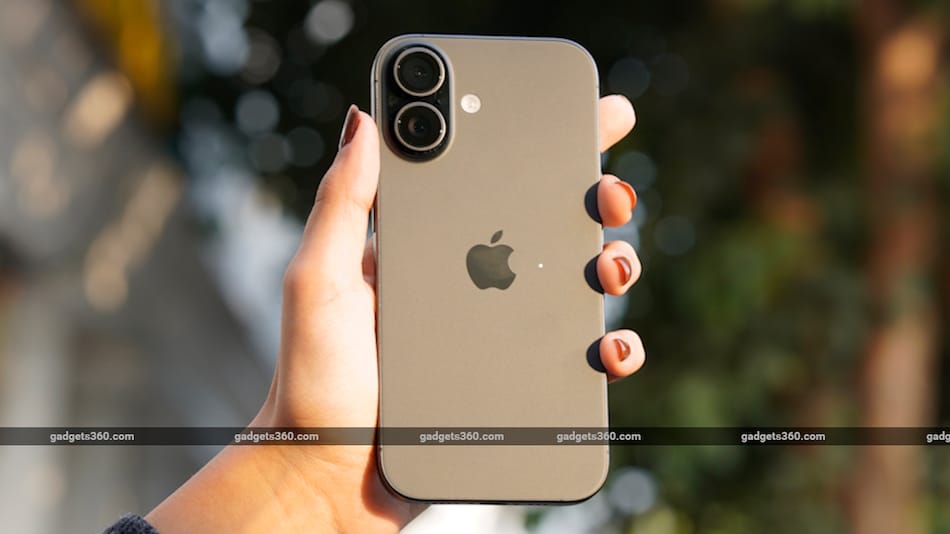- Home
- Mobiles
- Mobiles News
- Apple's iPhone 20 to Feature All Solid State Haptic Buttons in 2027, Tipster Claims
Apple's iPhone 20 to Feature All Solid-State Haptic Buttons in 2027, Tipster Claims
All mechanical buttons on the iPhone, including the power, volume, action, and camera, may be upgraded to solid-state buttons by 2027.

iPhone 17 (pictured) features a hybrid Camera Control button with mechanical and touch input
Apple is reportedly preparing for notable hardware changes for its future devices, beginning with the iPhone 18 series next year. According to a new leak from tipster Setsuna Digital (translated from Chinese) on Weibo, the company plans to replace mechanical buttons with solid-state controls featuring advanced haptic feedback by 2027. This shift marks a significant step toward more durable, responsive hardware while reducing moving parts. Beyond iPhones, the change could extend to upcoming iPad and Apple Watch models, signalling a broader evolution in Apple's device interaction design.
Apple's Long-Rumoured Solid-State Buttons Could Finally Debut on an iPhone
According to a Weibo post by the tipster, Apple has finished testing or functional verification of its solid-state button technology, meaning it now works as intended in prototypes. The company is preparing to mass-produce this feature for the iPhone 20 series in 2027.
By that time, all the physical buttons on the iPhone — including the power button, volume keys, action button, and camera controls — will switch from mechanical click buttons to solid-state buttons, as per the tipster. Instead of physically moving, they will simulate a click through localised haptic vibration feedback, making it feel like pressing a real button while improving durability and water resistance.
Before that full rollout, Apple will start transitioning to the iPhone 18 in 2026, according to the tipster. The camera control button will be the first to adopt a simplified pressure-sensing design, removing its current capacitive sensing layer, which detects touch.
In later versions, Apple plans to use piezoelectric ceramic components, which can create precise vibrations when pressed, providing a realistic tactile feel without any moving parts.
Apple may replace all mechanical buttons across its devices, including future iPads and Apple Watches, with solid-state keys. Since such major interface changes need extensive testing, the shift is still in development. The new buttons promise better durability and support for new gestures like firm press or swipe, but Apple is likely still fine-tuning the feel and responsiveness. It is safe to say that, for now, traditional mechanical buttons will stay until the technology is ready for mass use.
Catch the latest from the Consumer Electronics Show on Gadgets 360, at our CES 2026 hub.
Related Stories
- Samsung Galaxy Unpacked 2025
- ChatGPT
- Redmi Note 14 Pro+
- iPhone 16
- Apple Vision Pro
- Oneplus 12
- OnePlus Nord CE 3 Lite 5G
- iPhone 13
- Xiaomi 14 Pro
- Oppo Find N3
- Tecno Spark Go (2023)
- Realme V30
- Best Phones Under 25000
- Samsung Galaxy S24 Series
- Cryptocurrency
- iQoo 12
- Samsung Galaxy S24 Ultra
- Giottus
- Samsung Galaxy Z Flip 5
- Apple 'Scary Fast'
- Housefull 5
- GoPro Hero 12 Black Review
- Invincible Season 2
- JioGlass
- HD Ready TV
- Laptop Under 50000
- Smartwatch Under 10000
- Latest Mobile Phones
- Compare Phones
- Realme Neo 8
- OPPO Reno 15 FS
- Red Magic 11 Air
- Honor Magic 8 RSR Porsche Design
- Honor Magic 8 Pro Air
- Infinix Note Edge
- Lava Blaze Duo 3
- Tecno Spark Go 3
- Acer Chromebook 311 (2026)
- Acer Chromebook Spin 311
- Lenovo Idea Tab Plus
- Realme Pad 3
- Moto Watch
- Garmin Quatix 8 Pro
- Haier H5E Series
- Acerpure Nitro Z Series 100-inch QLED TV
- Asus ROG Ally
- Nintendo Switch Lite
- Haier 1.6 Ton 5 Star Inverter Split AC (HSU19G-MZAID5BN-INV)
- Haier 1.6 Ton 5 Star Inverter Split AC (HSU19G-MZAIM5BN-INV)






![[Sponsored] Haier C90 OLED TV | Dolby Vision IQ, 144Hz OLED and Google TV in Action](https://www.gadgets360.com/static/mobile/images/spacer.png)









